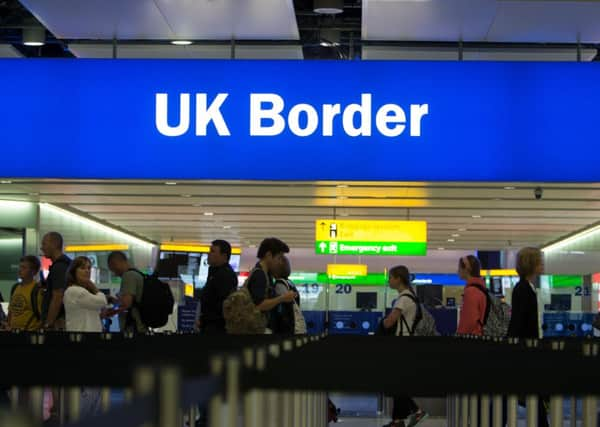Cameron targets blow as more EU migrants pour into Britain


Overall net migration - the difference between migrants leaving and arriving in the UK - rose to 243,000 in the year to March, a “statistically significant increase” from 175,000 the previous year, the Office for National Statistics (ONS) said.
A surge in immigration from within the European Union (EU) was behind the increase as two-thirds of all immigrants to the UK in the period - 214,000 out of 560,000 - came from within the EU.
Advertisement
Hide AdAdvertisement
Hide AdPrime Minister David Cameron and Home Secretary Theresa May previously announced a goal to cut net migration to below 100,000 by the general election on May 7 next year.
As immigration increased 13% from 492,000 in the previous year to 560,000, the number of people leaving the UK remained stable at 316,000, the ONS said.
Arrivals from within the EU increased by 44,000, or 25%, to 214,000 in the period, from 170,000 in the previous year.
Statisticians flagged another “statistically significant increase” in the number of Romanians and Bulgarians arriving in the UK, with immigration from the two Eastern European countries more than doubling to 28,000 in the year to March, from 12,000 in the previous year.
Advertisement
Hide AdAdvertisement
Hide AdRestrictions to the labour market were lifted for Romanians and Bulgarians on January 1, prompting warnings of a looming surge of immigration from the two countries.
A near three-year decline in the number of citizens from outside the EU immigrating to the UK appears to have ended, statisticians said.
The latest estimates for the year ending March show 265,000 non-EU citizens arrived in the UK, up from 246,000 in the previous year.
Immigration of non-EU citizens had been falling since the year ending September 2011, when an estimated 334,000 non-EU citizens immigrated to the UK.
Advertisement
Hide AdAdvertisement
Hide AdImmigration and security minister James Brokenshire said: “Uncontrolled, mass immigration makes it difficult to maintain social cohesion, puts pressure on public services and forces down wages. That’s why our focus remains on controlling migration at sustainable levels.
“Our reforms have cut net migration by a quarter since the peak under the last government - and have led to net migration from outside the EU falling to levels not seen since the 1990s.
“We are creating a system that is fair to British citizens and legitimate migrants but is tough on those who flout the rules.
“The Government has reformed benefits, healthcare and housing rules to make them among the tightest in Europe and we continue to see an increase in the number of British citizens in work.
Advertisement
Hide AdAdvertisement
Hide Ad“In the past, the majority of growth in employment was taken up by foreign nationals. In the last year, three-quarters of it was accounted for by UK nationals.
“The new Immigration Act continues our reforms by limiting benefits and services for illegal immigrants and making it easier to remove those with no right to be here by reducing the number of appeals.”
Mark Hilton, head of immigration policy at non-profit organisation London First, said the net migration target must be “put out of its misery”.
He said: “With the general election fast approaching, the Government is running out of time to hit its ‘tens of thousands’ target.
Advertisement
Hide AdAdvertisement
Hide Ad“The danger is ministers will take the only real steps open to them and clamp down on skilled non-EU migrants - who bring much-needed skills into the country - and students, who are not only a £10 billion market for us, but a key plank in Britain’s global influence in terms of ‘soft power’.
“At the very least, the Government should heed the calls of a long line of politicians, committees, and experts, and drop students from the net migration target.”
Tim Finch, associate director at think-tank Institute for Public Policy Research (IPPR), said: “Net migration has been in excess of 150,000 a year for every year over the last decade, apart from once, in 2012.
“The UK is now in a steady state of net migration of more than 200,000 per year, which can be expected to continue for the foreseeable future.”
Advertisement
Hide AdAdvertisement
Hide AdCarlos Vargas-Silva, senior researcher at the Migration Observatory at Oxford University, said: “Net migration has increased again, and is now close to the levels when the current Government took office, suggesting that the Government’s net migration target of under 100,000 is now effectively impossible to hit.
“The UK’s comparatively strong economic growth is attracting EU nationals, who have a right to live and work in the UK, to the British labour market - a very important factor in this increase.”
Sir Andrew Green, chairman of Migration Watch UK, said: “Getting the numbers down is proving even more difficult than expected, but either we get immigration under control or we accept that in the next 20 years we will have to build 12 new cities the size of Birmingham.
“Where can they possibly be put?”